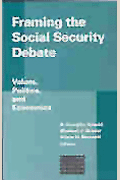In his 1998 State of the Union address, President Clinton challenged Americans to a public debate about how to fix the long-term financial problems of Social Security. This annual volume of the National Academy of Social Insurance provides a framework for that debate. Competing reform proposals reflect contrasting views about the nature of the Social Security problem and how to solve it. This book examines issues about privatization, national savings and economic growth, the political risks and realities in reforms, lessons from private pensions developments in the United States, and the efforts of other advanced industrial countries to adapt their old-age pensions to an aging population. It also poses philosophical arguments about collective versus individual responsibility and the implications of market risks and political risks for stable and secure retirement income policy. The contributors are Theo Angelis, Michael J. Boskin, Peter A. Diamond, John Geanakoplos, Hugh Heclo, Karen C. Holden, Howell Jackson, Olivia Mitchell, Dallas L. Salisbury, Lawrence H. Thompson, Kent Weaver, and Stephen P. Zeldes. Copublished with the National Academy of Social Insurance
Authors
Edited by

R. Douglas Arnold is professor of politics and public affairs at Princeton University. Michael J. Graetz is Justus S. Hotchkiss Professor of Law at Yale Law School. He served in the U.S. Department of Treasury from 1990 to 1992. His most recent book is Death by a Thousand Cuts (Princeton, 2005). Alicia H. Munnell is the Peter F. Drucker Professor of Management Sciences at Boston College's Carroll School of Management and director of the Center for Retirement Research at Boston College. A former member of the president's Council of Economic Advisers, she has written or edited numerous books, including Coming Up Short:The Challenge of 401(k) Plans, with Annika Sundén (Brookings, 2004).

